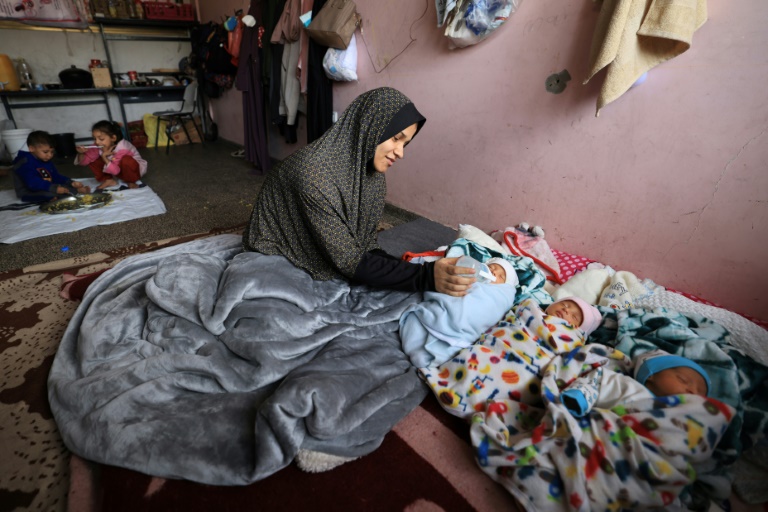Israel bombs Gaza as UN warns civilians face ‘grave peril’

Iman al-Masri, a displaced Palestinian woman in Gaza, feeds one of her quadruplets, the fourth of whom is still being treated in hospital
– Israeli forces on Thursday heavily bombed besieged Gaza as the centre of fierce combat against Hamas moves steadily south, where hundreds of thousands of displaced Palestinians are sheltering.
The war that started with the Hamas attack of October 7 has devastated much of northern Gaza, while air and artillery strikes and house-to-house fighting have been heaviest in the southern city of Khan Yunis.
The Israeli army has deployed an additional brigade to Khan Yunis, the hometown of Hamas leader Yahya Sinwar, said army spokesman Daniel Hagari.
More than 80 percent’s of Gaza’s 2.4 million people have been driven from their homes, and many now live in cramped shelters or makeshift tents in the far south, in and around the city of Rafah near Egypt.
UN World Health Organisation chief Tedros Adhanom Ghebreyesus called for “urgent steps to alleviate the grave peril” facing Gaza’s people, including “terrible injuries, acute hunger and… severe risk of disease”.
French President Emmanuel Macron in a call with Israeli Prime Minister Benjamin Netanyahu voiced his “deepest concern at the very heavy civilian toll” and stressed “the need to work towards a lasting ceasefire”, Macron’s office said.
Israel has vowed to destroy Hamas in retaliation for its bloody October 7 attack, which left about 1,140 people dead, most of them civilians, according to an AFP tally based on Israeli figures.
The Hamas gunmen also took around 250 hostages, 129 of whom remain in captivity — a source of intense grief and anxiety for their families who have held protests demanding urgent action to “bring them home”.
Israel’s relentless aerial bombardment and ground invasion with troops and tanks have killed at least 21,110 people, mostly women and children, according to Gaza’s Hamas-run health ministry.
The Israeli army says 167 of its soldiers have been killed in the war in Gaza.
– Quadruplets born in war –
Amid the conflict, an Israeli siege has deprived Gazans of food, water, fuel and medicine — the severe shortages only sporadically eased by convoys of humanitarian aid trucks.
One of the many people displaced, young mother Iman al-Masry, recently gave birth to quadruplets in a hospital in southern Gaza after fleeing her family’s home in the devastated north.
The arduous journey “affected my pregnancy”, the 28-year-old said, recounting that she gave birth by C-section on December 18 to two girls and two boys, one of whom was too fragile to leave hospital.
“They are very slim,” she said of the three other infants, speaking in a cramped schoolroom turned shelter in Deir al-Balah. “It’s cold and windy and there’s no bathtub … I just use wipes.”
“There’s no nutritious food I can eat to breastfeed the three babies.”
Violence has also flared across the Israel-occupied West Bank, with at least 314 Palestinians killed by Israeli forces or settlers since October 7, according to the territory’s health ministry.
Israeli forces made a deadly overnight raid into Ramallah, health officials said Thursday as troops raided money exchange shops which the military said had provided funds for armed groups.
An AFP journalist saw Palestinians hurl Molotov cocktails at Israeli forces, who killed one man according to the health ministry.
Israel has occupied the West Bank since the 1967 Arab-Israeli war and regularly carries out raids there, though they are far less common in the territory’s institutional heart Ramallah.
A United Nations report Thursday said the human rights situation in the West Bank was rapidly deteriorating and urged Israel to “end unlawful killings” against the Palestinian population.
“The use of military tactics and weapons in law enforcement contexts, the use of unnecessary or disproportionate force, and the enforcement of broad, arbitrary and discriminatory movement restrictions that affect Palestinians are extremely troubling,” UN rights chief Volker Turk said in a statement.
– Mideast tensions flare –
The bloodiest ever Gaza war has also sharply heightened tensions between Israel and its long-time arch foe Iran, which supports armed groups across the Middle East in what it dubs the “Axis of Resistance”.
Iran blamed Israel for a missile strike in Syria on Monday that killed the senior Iranian military commander Razi Moussavi, who was laid to rest at a tearful mass funeral in Tehran on Thursday.
The crowd chanted “Death to Israel” and “Death to America” after supreme leader Ayatollah Ali Khamenei led a prayer over the body of Moussavi, a senior commander of the Islamic Revolutionary Guard Corps’ foreign operations arms the Quds Force.
Guards spokesman Ramezan Sharif warned on Wednesday that “our response to Moussavi’s assassination will be a combination of direct action as well as (from) others led by the Axis of Resistance”.
Israel has traded heavy cross-border fire with Iran-backed Hezbollah in Lebanon since the Gaza war broke out, and warned it will step up military action unless the group’s militants withdraw further away from the border.
Army spokesman Hagari said Israeli forces had killed 129 Hezbollah militants since early October and that the Shiite movement “is paying a heavy price” for its attacks.
Another Iran ally, Yemen’s Huthi rebels, has launched repeated drone and missile attacks at Israel, which have been intercepted in the air, and fired at passing cargo ships in the Red Sea, disrupting international trade.
A drone also crashed near a village in the Israel-annexed Golan Heights, Israel’s army said Thursday, after an Iraqi armed group with links to Hamas claimed responsibility for an attack in the area.
Israeli media reported that a drone probably carrying explosives launched from Syria was shot down late Wednesday, causing no injuries but some material damage.
